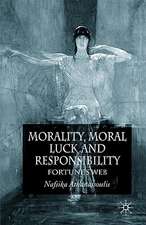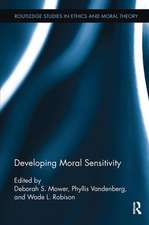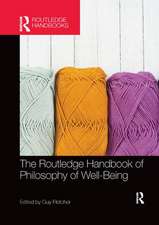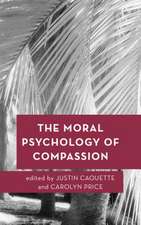Varieties of Virtue Ethics
Editat de David Carr, James Arthur, Kristján Kristjánssonen Limba Engleză Hardback – 20 dec 2016
Preț: 1003.38 lei
Preț vechi: 1223.63 lei
-18% Nou
Puncte Express: 1505
Preț estimativ în valută:
191.99€ • 200.100$ • 158.86£
191.99€ • 200.100$ • 158.86£
Carte tipărită la comandă
Livrare economică 07-21 aprilie
Preluare comenzi: 021 569.72.76
Specificații
ISBN-13: 9781137591760
ISBN-10: 1137591765
Pagini: 320
Ilustrații: XI, 352 p. 5 illus.
Dimensiuni: 148 x 210 x 25 mm
Greutate: 0.54 kg
Ediția:1st ed. 2017
Editura: Palgrave Macmillan UK
Colecția Palgrave Macmillan
Locul publicării:London, United Kingdom
ISBN-10: 1137591765
Pagini: 320
Ilustrații: XI, 352 p. 5 illus.
Dimensiuni: 148 x 210 x 25 mm
Greutate: 0.54 kg
Ediția:1st ed. 2017
Editura: Palgrave Macmillan UK
Colecția Palgrave Macmillan
Locul publicării:London, United Kingdom
Cuprins
1. Introduction.- Part 1: Philosophical Varieties of Virtue and Virtue Ethics.- 2. Chapter 1: The Varieties of Virtue Ethics. Robert C. Roberts.- 3. Chapter 2: Which variety of virtue ethics? Julia Annas.- 4. Chapter 3: Against idealization in virtue ethics. Howard Curzer.- 5. Chapter 4: Virtue ethics in the medieval period. John Haldane.- 6. Chapter 5: Iris Murdoch and the varieties of virtue ethics. Konrad Banicki.- 7. Chapter 6: Confucian and Daoist virtue ethics. May Sim.- Part 2: Virtue Ethics in the Wider Academic Context.- 8. Chapter 7: Aristotelian ethical virtue: naturalism without measure. Jonathan Jacobs.- 9. Chapter 8: Categorising character: moving beyond the Aristotelian framework. Christian Miller.- 10. Chapter 9: Human practices and God’s making-good in Aquinas’ virtue ethics. Richard Conrad.- 11. Chapter 10: Recovered goods: Durheimian sociology as virtue ethics.
;Philip Gorski.- 12. Chapter 11: The deep psychology of eudaimonia and virtue: belonging, loyalty and the anterior cingulate cortex. Blaine Fowers.- 13. Chapter 12: Virtue, the common good and self-transcendence. Candace Vogler.- Part 3: Virtue Ethics and the Wider Professional and Educational Context.- 14. Chapter 13: Plato on the Necessity of Imitation and Habituation for the Cultivation of the Virtues. Mark Jonas.- 15. Chapter 14: Maintaining primary professional virtues by protecting properly oriented relationships: medical practice as a case study. Justin Oakley.- 16. Chapter 15: ‘Till we have faces’: second-person relatedness as the object, end and crucial circumstance of perfect or ‘infused’ virtues. Andrew Pinsent.- 17. Chapter 16: The seduction of Kierkegaard’s aesthetic sphere. Kevin Gary.- 18. Chapter 17: Distinguishing Post-Traumatic Growth from Psychological Adjustment among Rwandan Genocide Survivors. Laura E. R. Blackie, Eranda Jayawickreme, Nicki Hitchcott and Stephen Joseph.- 19. Chapter 18: Educating for the wisdom of virtue. David Carr.-
;Philip Gorski.- 12. Chapter 11: The deep psychology of eudaimonia and virtue: belonging, loyalty and the anterior cingulate cortex. Blaine Fowers.- 13. Chapter 12: Virtue, the common good and self-transcendence. Candace Vogler.- Part 3: Virtue Ethics and the Wider Professional and Educational Context.- 14. Chapter 13: Plato on the Necessity of Imitation and Habituation for the Cultivation of the Virtues. Mark Jonas.- 15. Chapter 14: Maintaining primary professional virtues by protecting properly oriented relationships: medical practice as a case study. Justin Oakley.- 16. Chapter 15: ‘Till we have faces’: second-person relatedness as the object, end and crucial circumstance of perfect or ‘infused’ virtues. Andrew Pinsent.- 17. Chapter 16: The seduction of Kierkegaard’s aesthetic sphere. Kevin Gary.- 18. Chapter 17: Distinguishing Post-Traumatic Growth from Psychological Adjustment among Rwandan Genocide Survivors. Laura E. R. Blackie, Eranda Jayawickreme, Nicki Hitchcott and Stephen Joseph.- 19. Chapter 18: Educating for the wisdom of virtue. David Carr.-
Notă biografică
James Arthur is Deputy Pro-Vice-Chancellor for Staffing and Professor of Education and Civic Engagement at the University of Birmingham, UK. He is Director of the Jubilee Centre for Character and Virtues. Among his many works on the education of character and virtue are The Communitarian Agenda in Education (2001) and Education with Character (2003).
David Carr is Emeritus Professor at the University of Edinburgh and currently Professor of Ethics and Education in the University of Birmingham Jubilee Centre for Character and Virtues, UK. He has written much on the significance of art and literature for educating moral character and recently edited a volume of essays entitled Perspectives on Gratitude: An Interdisciplinary Approach (2016).
Kristján Kristjánsson is Professor of Character Education and Virtue Ethics, and Deputy Director of the Jubilee Centre for Character and Virtues, University of Birmingham, UK. His research focuses on issu
es at the intersection of moral philosophy, moral psychology and moral education. His latest book is Aristotelian Character Education (2015).
David Carr is Emeritus Professor at the University of Edinburgh and currently Professor of Ethics and Education in the University of Birmingham Jubilee Centre for Character and Virtues, UK. He has written much on the significance of art and literature for educating moral character and recently edited a volume of essays entitled Perspectives on Gratitude: An Interdisciplinary Approach (2016).
Kristján Kristjánsson is Professor of Character Education and Virtue Ethics, and Deputy Director of the Jubilee Centre for Character and Virtues, University of Birmingham, UK. His research focuses on issu
es at the intersection of moral philosophy, moral psychology and moral education. His latest book is Aristotelian Character Education (2015).
Textul de pe ultima copertă
This book explores recent developments in ethics of virtue. While acknowledging the Aristotelian roots of modern virtue ethics – with its emphasis on the moral importance of character – this collection recognizes that more recent accounts of virtue have been shaped by many other influences, such as Aquinas, Hume, Nietzsche, Hegel and Marx, Confucius and Lao-tzu. The authors also examine the bearing of virtue ethics on other disciplines such as psychology, sociology and theology, as well as attending to some wider public, professional and educational implications of the ethics of virtue. This pioneering book will be invaluable to researchers and students concerned with the many contemporary varieties and applications of virtue ethics.
Caracteristici
Presents accessible and informative analysis of recent developments in ethics of virtue Collates the work of numerous authors and crosses disciplines in order to examine ethics in psychology, sociology and theology Enables understanding of global perspectives and influences upon the concept of virtue

























